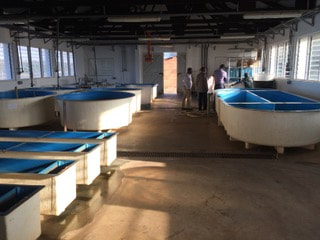|
The World Aquaculture Society will hold its conference August 25-29 in Montpelier, France. Like most conferences, it will have a blend of research presentations, vendors, investors, processors, and educators present. If you have a chance- and you are in the area, I suspect this will be a nice conference to attend. Abstracts for the conference are now being posted. The nice thing about these abstracts is you can access them online with no apparent restrictions (please let me know if I am wrong. One such abstract popped up on my radar this past week, and I thought I would share it with you. BLACK SOLDIER FLY FED TO STURGEON Acipenser baerii JUVENILES: DIGESTIBILITY AND WHOLE BODY COMPOSITION The study was conducted by my friend and colleague, Dr. Laura Gasco with the Department of Agricultural, Forest, and Food Sciences, University of Torino in Italy. In this study, they examined the development of sturgeon juveniles (like the title says) fed diets with 25 and 50% fishmeal replacement with BSF. Based on the abstract, it appears the BSF can be used as a replacement. The abstract contains a nice table comparing the data generated from the study. So, you can actually see where the differences are between the diets and their impact on the fish. The authors do also raise the question regarding chitin (I embedded a link to Wikipedia where you can read about chitin and its role in nature) and digestibility. I am not aware of anyone doing any extensive work to address this question; however, it does appear to be one raised by a host of researchers in the field. I am by no means an expert on chitin; however, I had a discussion with a colleague at a PetFood Forum in Kansas City, Missouri, USA this past week (yes- a lot of interest in the use of insects for pet food), and he astutely pointed out that chitin represents such a low percentage (extremely low) of the overall insect matter- does it really matter? I raise this question to you- consider this point and let me know what you think? I welcome discussion. AuthorJeff Tomberlin, PhD, BSF nutritionist of sorts
0 Comments
The study of interest in today's blog post, which was recently published in the Journal of Insects as Food and Feed (check out the journal- you can read the abstracts and learn quite a bit about the diversity of research taking place around the world on this topics), relied on published data to assess the suitability of the BSF as a feed replacement of fishmeal for rainbow trout. The study in question is:
Potentials of a biogenic residue-based production of Hermetia illucens as fish meal replacement in aquafeed for Oncorhynchus mykiss in Germany Unfortunately, the study, beyond the abstract, is not accessible to the general public or if your library does not have access either. The review provides a general assessment of the production of rainbow trout in German and indicates it is the most produced fish in country (seems to be close to 50% of fish produced in country annually 8.5 tonnes of 20 tonnes produced annually). You can read about German fish production through the Food Industry of Food and Agriculture website. They assume numbers previously published on replacing fishmeal with BSF (50%) (example in link) and relate such a requirement to current resource streams available for producing BSF. These waste streams include forestry and wood industry wastes, agricultural by-products, municipal wastes, and industrial residues (e.g., food production- slaughter, harvested fruits & vegetables, etc). They conclude the BSF could be produced at a level necessary to replace portions of fishmeal; however, the level of production will be dependent on the waste stream used to produce the BSF larvae. Basically, input drives output. Of course, there are still a number of uncertainties regarding the BSF industry (scalability, stable availability of waste streams, quality assurance, nutrient stability of BSF larvae produced and so on). THOUGHTS GENERATED FROM READING PAPER: My impression is the conclusions being drawn throughout the world keep coming a back to the same points. And, I do think interest, and action towards resolving these issues, continues to grow. At this time, I conclude no single company will be able to provide all of the BSF needed to meet the needs of one, much less all, industry groups interested in using the BSF. But, I take this as as great opportunity. How can we partner together to meet these demands? Through many we will be stronger, stable, and impactful. What do you think? Here is a second video that demonstrates BSF larvae feeding. Very nice video providing close-up of a larva feeding on a substrate. Nice time-lapse video as well of a pizza being consumed.
Very short post- but a cool one.
Check out this work from Georgia Tech on the mechanics behind black soldier fly larval feeding. This type of research could really lead to optimization of larval feeding efficiency of the black soldier fly, which could revolutionize the industry. The Hungry Maggot Hope you enjoy!  As EVO continues to grow, we are always discussing how we will structure our company so that it meets our mission in the broadest sense possible. EVO is very committed to the environment as well as the community. One way we want to build a stronger relationship with our community is by providing opportunities to our military veterans. We are grateful for their service and want to provide opportunities to those interested in sustainable agriculture that lead to their success. These opportunities not only include employment but training in the art of BSF production as well as allowing them to play a role in our efforts to network with individuals in less developed nations and help them develop their own BSF production. Through such efforts- everyone is successful. With this said, EVO has hired Mr. Sterling Classen-Reid. Sterling served in the United States Marine Corps as an Infantryman from 2010 - 2014 and completed his service as a Lance Corporal. He is currently pursuing a degree in Rangeland Ecology and Management at Texas A&M University. Sterling was born in Fort Worth, TX and has lived in Ohio, Florida, Idaho, California, and back to Texas. He enjoys working with computers; his dog, aka best friend, Diablo. Sterling loves playing paintball; he is a prolific writer; he is an amazing photographer; and, he is going to Africa on a work-study scholarship for the second summer in a row; he has been published in the newspaper and interviewed on TV for advocating for traffic safety. Welcome aboard, Sterling! The EVO team looks forward to partnering with you on a common mission to protect the environment, create jobs, and provide protein for sustainable agriculture use.  Aquaculture facilities are state of the art and welcome collaborations on the use of insects as feed. Aquaculture facilities are state of the art and welcome collaborations on the use of insects as feed. In recent years, amazing progress has been made advocating insects as new sources of protein to mediate the global food shortage and improve diet nutrition. Much of this progress is directed toward creating new economies in industrial nations in efforts assess the potential for adding value in food production chains using insects, and creating optimized methods for wide-spread acceptance and use. Progress is also needed on a global scale, especially in the developing world where malnutrition affects much of the local populations. The black soldier fly (BSF) system offers a remarkable opportunity as a reliable, sustainable protein source that is the result of organic matter recycling and conversion. There is a need for insect production systems development in communities of developing nations, from villages to large urban centers, most impacted by food insecurity in Sub-Saharan Africa. The BSF system can create new revenue streams that meet the demands of the local and regional economies, from small villages of less than 100 people to larger cities with large produce markets. Farming BSF for feed in developing nations will require developing partnerships that bring together experts in entomology, food nutrition, food production and human health. To begin to address this need in Malawi, we have developed a transcontinental partnership between Michigan State University (MSU) and two Universities in Malawi, Africa: Lilongwe University of Agriculture and Natural Resources (LUANAR),and the College of Medicine at the University of Malawi.The tentative name for our partnership is the Global Alliance for Insect Farming in Africa(GAIFA). A key goal of this alliance, initially funded by the MSU Alliance for African Partnership initiative, is tobring together experts, professionals, local stakeholders, and organizations from Africa and MSU to work toward a common goal of achieving farming insects for feed. We envision that developing a network of partnerships between researchers and local members of the community will improve sustainable food security in Malawias an initial example, but also in many other Sub-Saharan countries with critical nutritional needs. The objectives of our partnership are to: 1) identify local stakeholders that would potentially implement the use of insects as a novel feedstock for livestock, such as aquaculture and poultry; and 2) identify insect species and their food sources, such as market waste, to be targeted in future research. These data collection efforts will then be used for funding applications in which the end goal would be to optimize insects and their associated microbiomes to improve nutrition in a manner that will benefit local communities. Thus, the resulting research will improve African livelihoods by increasing the amount of available protein for consumption through improved livestock, and will enhance livelihood security of individuals through community-level actions, creating new revenue streams and enabling women and children in the process. By accomplishing these goals, our partnership intends to develop the important capacity to enable local individuals to create new revenue streams that directly improve the local nutritional needs of villages, hamlets and sub-urban populations. Indeed, by converting local waste into new sources of animal feed, the BSF system (and other insect systems) has the potential to create new revenue opportunities, especially for women and children that could have village to regional level impact towards improving human health and development. Our partnership is continuously evolving and we look forward to meeting and interacting with new collaborators (like EVO Conversion Systems) at the individual, group and institutional levels. Please contact any of us at or respective email addresses if you have interest in joining us in developing insects for food, feed and health in Africa. AuthorDr. M. Eric Benbow |
AuthorIndividuals with over 25 years research experience with the black soldier fly. We are passionate about the science behind the black soldier fly and its ability to convert waste to protein. Get Notified Here
Archives
September 2022
Categories
All
Install an RSS app to get notified from us when a new post is up!
|
ServicesSupport |
About |


 RSS Feed
RSS Feed

